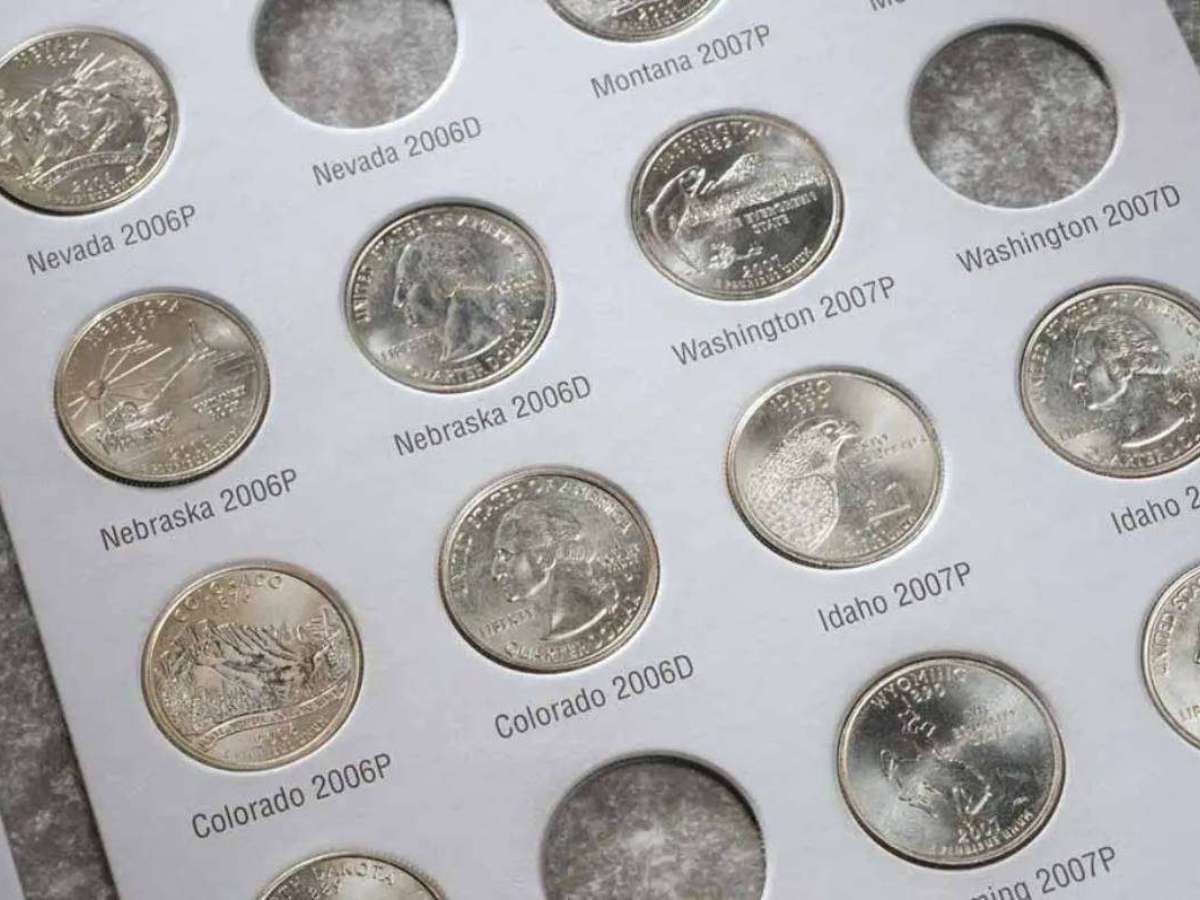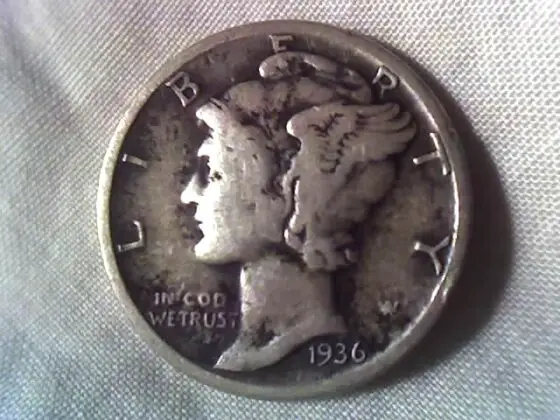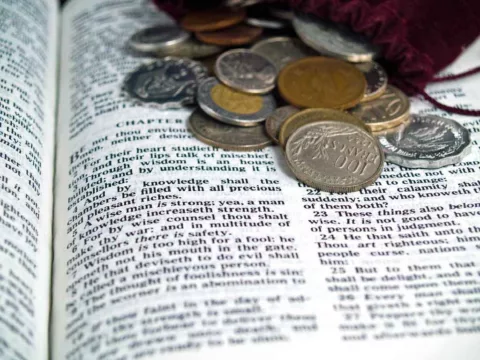
Coins from the Bible (especially during Jesus’ lifetime, at the turn of the first millennium) are some of the most famous and beloved of all ancient coins.
The Bible is the holy book of Christian religions. It is divided into the Old Testament and the New Testament comprising 73 books in the Roman Catholic Bible and 66 in the Protestant iteration, known as the King James Version.
While many of those who believe in Jesus Christ as their lord or who believe him to be the Messiah would consider themselves Christian, Jesus himself was not Christian. Jesus was Jewish, and those who follow his teachings are called Christians in honor of his name, Christ.
Why is all of this important to so many coin collectors?
Because there are countless people who collect ancient coins from the Bible and the times of Jesus!
My interest in rare coins of the Bible and Jesus’ time stems from my life as a Catholic Christian — attending church since childhood and hearing many Bible readings during Mass that reference various ancient coins.
What Are The Bible Coins Of Jesus’ Time?
There are many different types of coins mentioned throughout the Bible — from the Persian Imperial coins encountered in the Old Testament to the Widow’s Mite featured in the New Testament.
Whether you believe in Jesus as divine or more as an historical figure, the coins associated with him are among the most significant in archaeological circles — and certainly among many coin collectors.
The Widow’s Mite is a Judean bronze coin that is formally known as a Hasmonean lepton (or sometimes referred to as a prutah). It is one of the four coins in the Bible that figure prominently with Jesus and his life as depicted in scripture. The other three coins are:
- The Roman denarius
- The Phoenician shekel
- The Phoenician half shekel
While I find these four coins especially iconic because of their connection to Jesus, you don’t have to be religious or believe in Jesus as a holy figure in the Christian tradition to appreciate the historical importance of these Bible coins!
Let’s look more closely at the 4 coins of Jesus’ lifetime…
Widow’s Mite Coin
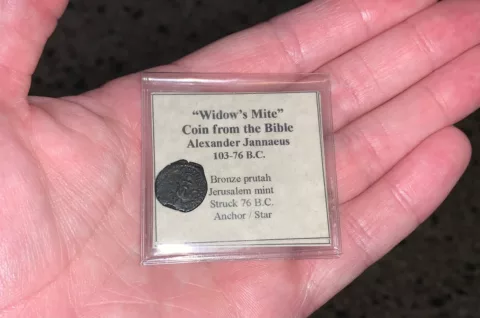
I own a Widow’s Mite, the Judean lepton coin (or prutah) traced back in the Bible to a woman who gave two of these small bronze coins brought to Jesus as told in the Gospel of Mark:
“[Jesus] sat down opposite the treasury and observed how the crowd put money into the treasury. Many rich people put in large sums. A poor widow also came and put in two small coins worth a few cents. Calling his disciples to himself, he said to them, ‘Amen, I say to you, this poor widow put in more than all the other contributors to the treasury. For they have all contributed from their surplus wealth, but she, from her poverty, has contributed all she had, her whole livelihood'” (Book of Mark, Chapter 12, Verses 41-44).
It’s a story of sacrifice, of magnanimity, and of love. And it reminds all of us to give as much as we can — not just treasure, but of our time and talent as well.
Thankfully, for those who wish to own a Widow’s Mite, these Bible coins are not worth so much that they are beyond the financial reach of the masses. A typical Widow’s Mite has a value of $10 to $50, depending on the condition of the coin. You can buy a Widow’s Mite (or lepton coin) from a coin dealer who specializes in ancient coins.
Roman Denarius Coin
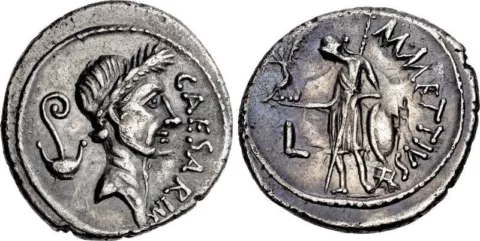
Among the most famous Roman coins of the Bible and Jesus is the denarius.
The Roman denarius was a standard silver coin in the currency of Jesus’ time. A Roman denarius was worth about one day’s wages at the time, as mentioned in the Gospel of Matthew story about vineyard workers:
“Now the kingdom of Heaven is like a landowner going out at daybreak to hire workers for his vineyard. He made an agreement with the workers for one denarius a day and sent them to his vineyard. Going out at about the third hour he saw others standing idle in the marketplace and said to them, ‘You go to my vineyard too and I will give you a fair wage.’ So they went. At about the sixth hour and again at about the ninth hour, he went out and did the same. Then at about the eleventh hour he went out and found more men standing around, and he said to them, ‘Why have you been standing here idle all day?’ ‘Because no one has hired us,’ they answered. He said to them, ‘You go into my vineyard too.’ In the evening, the owner of the vineyard said to his bailiff, Call the workers and pay them their wages, starting with the last arrivals and ending with the first.’ So those who were hired at about the eleventh hour came forward and received one denarius each. When the first came, they expected to get more, but they too received one denarius each. They took it, but grumbled at the landowner saying, ‘The men who came last have done only one hour, and you have treated them the same as us, though we have done a heavy day’s work in all the heat.’ He answered one of them and said, ‘My friend, I am not being unjust to you; did we not agree on one denarius? Take your earnings and go. I choose to pay the lastcomer as much as I pay you. Have I no right to do what I like with my own? Why should you be envious because I am generous?’ ‘Thus the last will be first, and the first, last'” (Book of Matthew, Chapter 20, Verses 1-16).
The silver Roman denarius coins appear in the Bible in another famous parable seen in the Gospel of Mark:
“They sent some Pharisees and Herodians to him to ensnare him in his speech. They came and said to him, ‘Teacher, we know that you are a truthful man and that you are not concerned with anyone’s opinion. You do not regard a person’s status but teach the way of God in accordance with the truth. Is it lawful to pay the census tax to Caesar or not? Should we pay or should we not pay?’ Knowing their hypocrisy he said to them, ‘Why are you testing me? Bring me a denarius to look at.’ They brought one to him and he said to them, ‘Whose image and inscription is this?’ They replied to him, ‘Caesar’s.’ So Jesus said to them, ‘Repay to Caesar what belongs to Caesar and to God what belongs to God'” (Book of Mark, Chapter 12, Verses 13-17).
In some King James Version translations of that same scripture, the denarius is referred to as a “penny” and is widely known as a Tribute Penny.
Many people are interested in buying denarius silver Bible coins. They are worth anywhere from $700 to more than $3,000 apiece.
Phoenician Shekel & Half Shekel Coins
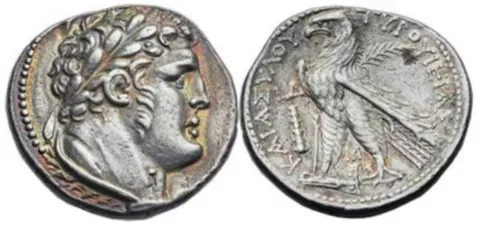
The Phoenician shekel and half shekel coins figure prominently with Jesus in the Bible during several occasions. Such as in Chapter 30 of Exodus, when it is said that those who were 20 years of age or older had to pay a census tax of a half shekel. The matter of the census tax comes up again with Jesus in the Gospel of Matthew, Chapter 17, Verses 24-27.
Shekels were certainly among the coins on the tables that Jesus overturned during the cleansing of the temple in the Gospel of Mark, Chapter 11, Verses 15-19:
“They came to Jerusalem, and on entering the temple area he began to drive out those selling and buying there. He overturned the tables of the money changers and the seats of those who were selling doves. He did not permit anyone to carry anything through the temple area. Then he taught them saying, ‘Is it not written: My house shall be called a house of prayer for all peoples? But you have made it a den of thieves.’ The chief priests and the scribes came to hear of it and were seeking a way to put him to death, yet they feared him because the whole crowd was astonished at his teaching. When evening came, they went out of the city.”
And those “30 pieces of silver” paid to Judas for betraying Jesus in the Gospel of Matthew, Chapter 26, Verses 14-16? Many Bible and history scholars believe those coins were Tyrian shekels.
A half shekel is worth anywhere from $500 to $2,000, while shekel coins from the time of Jesus usually have a value of $2,000 and up.
The following video includes each of the coins from Jesus’ time mentioned above, plus other coins mentioned in the Bible:


